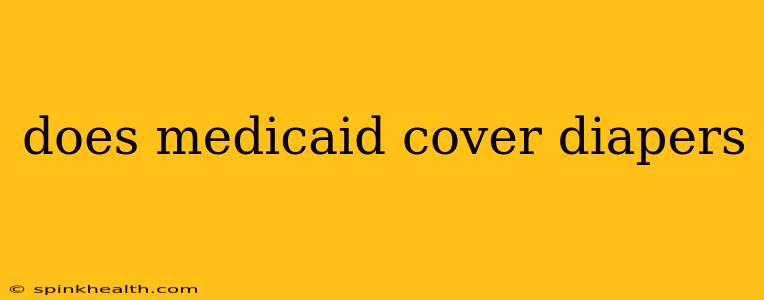The rustling of a diaper bag, the constant changing, the seemingly endless supply needed… parenthood is filled with many joys, but the financial burden of raising a child is often a significant concern. One question many parents on Medicaid frequently ask is: Does Medicaid cover diapers? The short answer is: it's complicated. There's no blanket yes or no. The coverage depends on several factors, and navigating the system can feel like a maze. Let's unravel this together.
What Factors Determine Medicaid Diaper Coverage?
Medicaid, a joint federal and state program, varies significantly from state to state. This means diaper coverage isn't uniform across the country. Some states might offer direct diaper assistance, others might include it within broader programs, while many offer no direct coverage at all. This is why understanding your specific state's Medicaid program is crucial.
State-Specific Programs: The Key Variable
Your state's Medicaid agency is the ultimate authority on what's covered. Their website will be your best resource, often containing specific details about coverage for diapers, or at least a contact number to ask directly. Don't hesitate to reach out – they are there to help.
Eligibility Criteria Beyond State Lines
Even within states offering some form of diaper assistance, eligibility criteria often exist. These might include:
- Income level: Your household income must typically fall below a certain threshold to qualify for Medicaid assistance, and the diaper assistance programs often have their own income restrictions.
- Child's age: Some programs may only cover diapers for infants or young children, while others may extend coverage up to a certain age.
- Other factors: Certain disabilities or specific medical conditions of the child could also influence eligibility.
Where to Find Diaper Assistance Programs (Beyond Medicaid)
If Medicaid in your state doesn't cover diapers, don't despair. Several other avenues can provide assistance.
WIC Programs: Supplemental Nutrition
While not directly focused on diapers, the Special Supplemental Nutrition Program for Women, Infants, and Children (WIC) might offer some indirect support. WIC focuses on nutrition, providing vouchers for healthy foods. A healthier diet can contribute to better overall health, potentially reducing diaper rash and other related issues that increase diaper usage.
Local Charities and Non-profits: A Community Lifeline
Many local organizations, churches, and food banks often run diaper drives or have partnerships with diaper banks. These offer a critical safety net for families struggling to afford diapers. Searching online for "[your city/county] diaper bank" or similar terms can lead you to invaluable local resources.
National Organizations: Extending the Reach
Several national organizations are dedicated to providing diaper assistance. They often connect families with local resources or directly provide diapers based on need. Researching these organizations can reveal further avenues of support.
How to Apply for Medicaid and Related Programs
The application process for Medicaid varies by state, so again, your state's Medicaid website is the best starting point. You'll typically need to provide documentation proving your income, residency, and the identities of those in your household.
What to Expect During the Application Process
Be prepared to provide detailed financial information and documentation regarding your family's situation. The process can take time, so be patient and persistent.
Frequently Asked Questions (FAQs)
Does Medicaid cover diapers for adults?
Medicaid coverage for adult diapers is generally based on the individual's specific medical condition and need for incontinence supplies. It's not automatically covered as it is for infants. You need a doctor's prescription and the approval of your state Medicaid program.
What if I don't qualify for Medicaid? Are there other options?
Absolutely! As mentioned earlier, explore local charities, food banks, and national organizations dedicated to diaper assistance. These resources often serve as crucial safety nets for families who don't qualify for Medicaid.
Can I get help with other baby supplies besides diapers through Medicaid?
Medicaid's coverage extends beyond diapers in some circumstances. Certain baby supplies might be covered if directly related to a medical necessity. For example, if a child has a specific skin condition, special creams or ointments might be covered. However, general baby supplies are not typically included.
How much does a package of diapers typically cost?
Diaper costs vary drastically depending on size, brand, and retailer. Parents often spend hundreds of dollars on diapers annually. This highlights the significant financial strain it places on low-income families.
In conclusion, the question of whether Medicaid covers diapers doesn't have a simple yes or no answer. It hinges on your state's specific program, your eligibility, and the availability of supplementary programs. Actively researching your state's policies and exploring the numerous additional resources available is key to finding the support you need. Remember, you’re not alone in this journey, and seeking help is a sign of strength, not weakness.

